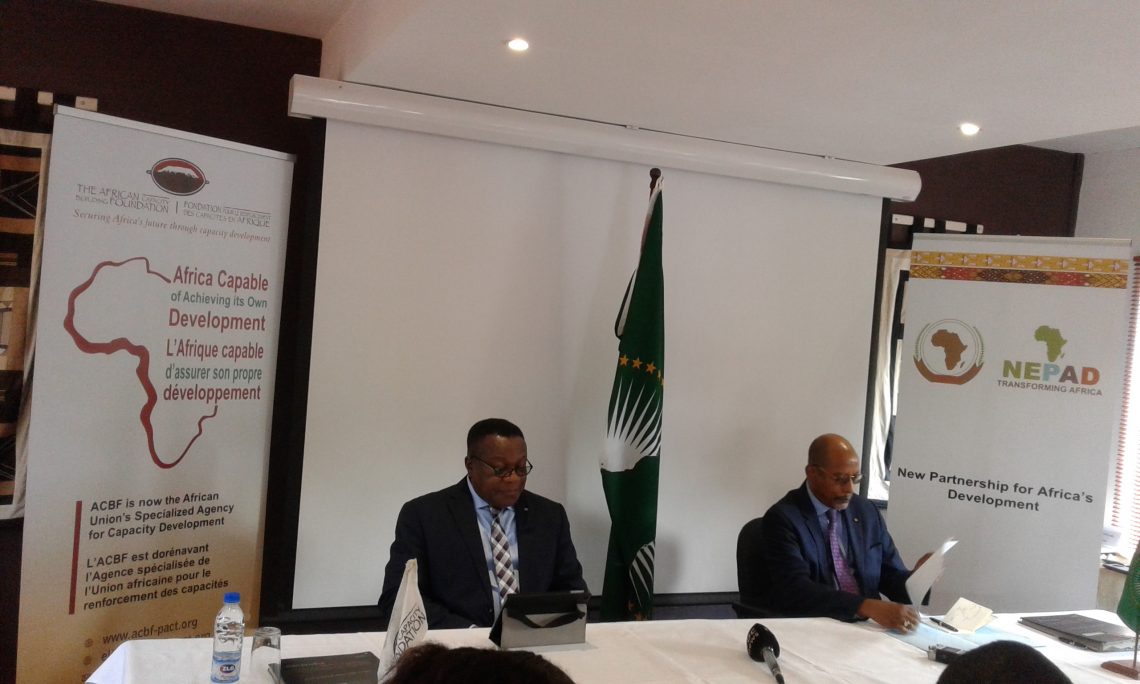By Byron Mutingwende
Africa has a youth bulge and there is need for the continent to harness the demographic dividend so as to guard against future potential socio-economic crisis and disharmony, it has emerged.
The sentiments were expressed on 20 December 2017 on the occasion of the official signing of a memorandum of understanding (MOU) between the New Partnership for Africa’s Development (NEPAD) and the Africa Capacity Build Foundation (ACBF) in Harare meant to build partnerships for supporting the implementation of the continent’s socio-economic transformation.
Addressing journalists at the event, Dr. Ibrahim Assane Mayiki, the Chief Executive Officer of the NEPAD Planning and Coordinating Agency and former Prime Minister of Niger said youths should be at the centre of all development initiatives in Africa.
“There is a need to address the problem of youth unemployment on the continent by creating jobs for the 450 million young Africans. There are vast opportunities in renewable energy, agribusiness and mining projects. Creating jobs for the young people will be a panacea against potential crises that may occur when the youths are not employed as witnessed in North African countries. We also need to work on sills development among the youths,” Dr. Mayiki said.
Professor Emmanuel Nnadozie, the ACBF Executive secretary reiterated the need to educate and equip African youths with entrepreneurial skills and called for a tripartite dialogue involving the government, institutions of higher learning and the private sector.
“We need skills and human capital development by ramping up vocational and technical training institutions. The problem of de-industrialisation will be addressed through skills development among the youths, bearing in mind the critical role of developing national and regional solutions towards addressing unemployment,” Prof Nnadozie said.
Alluding to the MOU, Prof Nnadozie said a number of activities have been implemented in the past between the ACBF and NEPAD, with ACBF directly investing $2 million, out of which NEPAD managed to absorb about $1 869 244.
“However, the two parties now endeavour to engage more strategically on areas of common interest based on Africa’s emerging capacity needs, hence the need to formally renew and step up our level of engagement.”
The MOU will provide a framework of cooperation to facilitate collaboration between ACBF and NEPAD, focusing on the strengthening of capacity development in Africa for the effective implementation, monitoring and evaluation of Agenda 2063 and its 10-Year Plans. Priority areas of mutual focus will include implementation, monitoring and evaluation of capacity development priorities in the first 10-Year Plan of Agenda 2063 and Agenda 2030; joint implementation of AU/NEPAD 2015-2025 Capacity Development Plan for Regional Economic Communities on Institutional Development for effective implementation of Regional Development Plans and Agenda 2063; joint implementation of findings from ACBF’s assessment of RECs Capacity needs; partnerships in the design and implementation of critical technical skills development programmes at country and regional level; cooperation on development and publication of the ACBF flagship Africa capacity reports and other capacity development knowledge products; and jointly mobilise resources for the implementation of the areas of collaboration as described in Article IV of the MOU.
The leaders of the two institutions called for domestic resource mobilisation of funds and coordination among the multiplicity of players on the African continent in capacity development to make the implementation of the MOU successful. They said that the efforts should be complemented by the support of the political leadership in pursuit of the Agenda 2063 and the Sustainable Development Goals.
